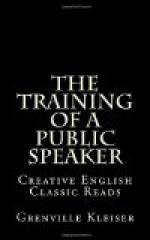But nothing else will so well suit an exordium as modesty in the countenance, voice, thoughts, and composition, so that even in an uncontrovertible kind of cause, too great confidence ought not to display itself. Security is always odious in a pleader, and a judge who is sensible of his authority tacitly demands respect.
An orator must likewise be exceedingly careful to keep himself from being suspected, particularly in that regard; therefore, not the least show of study should be made, because all his art will seem exerted against the judge, and not to show this is the greatest perfection of art. This rule has been recommended by all authors, and undoubtedly with good reason, but sometimes is altered by circumstances, because in certain causes the judges themselves require studied discourses, and fancy themselves thought mean of unless accuracy appears in thought and expression. It is of no significance to instruct them; they must be pleased. It is indeed difficult to find a medium in this respect, but the orator may so temper his manner as to speak with justness, and not with too great a show of art.
THE NEED OF SIMPLICITY OF EXPRESSION
Another rule inculcated by the ancients is not to admit into the exordium any strange word, too bold a metaphor, an obsolete expression, or a poetical turn. As yet we are not favorably received by the auditors, their attention is not entirely held, but when once they conceive an esteem and are warmly inclined toward us, then is the time to hazard this liberty, especially when we enter upon parts the natural fertility of which does not allow the liberty of expression to be noticed amidst the luster spread about it.
The style of the exordium ought not to be like that of the argument proper and the narration, neither ought it to be finely spun out, or harmonized into periodical cadences, but, rather, it should be simple and natural, promising neither too much by words nor countenance. A modest action, also, devoid of the least suspicion of ostentation, will better insinuate itself into the mind of the auditor. But these ought to be regulated according to the sentiments we would have the judges imbibe from us.
It must be remembered, however, that nowhere is less allowance made than here for failing in memory or appearing destitute of the power of articulating many words together. An ill-pronounced exordium may well be compared to a visage full of scars, and certainly he must be a bad pilot who puts his ship in danger of sinking, as he is going out of port.
In regard to the length of the exordium, it ought to be proportionate to the nature of the cause. Simple causes admit of a shorter exordium; the complex, doubtful, and odious, require a longer exordium. Some writers have prescribed four points as laws for all exordiums,—which is ridiculous. An immoderate length should be equally avoided, lest it appear, as some monsters, bigger in the head than in the rest of the body, and create disgust where it ought only to prepare.




